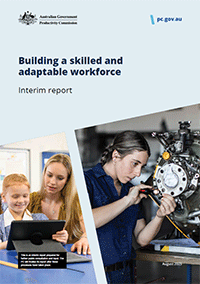Building a skilled and adaptable workforce

Interim report
Released 11 / 08 / 2025
The PC has been asked by the Australian Government to conduct an inquiry into Building a skilled and adaptable workforce. As part of this work, we have been tasked with identifying priority reforms and developing actionable recommendations.
In this interim report, the PC presents draft recommendations focused on three key policy reform areas:
- The best resources to improve school student outcomes
- Building skills and qualifications for a more productive workforce
- Fit-for-purpose occupational entry regulations.
Webinar
Podcast
A transcript will be available shortly.
Better support for Australians to transition through education and work key to a stronger economy
Australia should introduce a single online platform for all teachers to access high-quality lesson plans, a national approach to education technologies including those involving AI, support flexible learning pathways for students and ongoing training in work and reduce restrictive occupational entry regulations to make the best use of workers’ skills, the interim report of a Productivity Commission inquiry recommends.
The interim report, Building a skilled and adaptable workforce, is the fourth of five that the PC is publishing over two weeks setting out practical reforms to boost Australia’s productivity.
‘A thriving, adaptable workforce will give us the productivity growth we need to see higher wages and better living standards,’ said PC Deputy Chair Alex Robson.
‘As the pace of economic change continues to accelerate, we need to ensure we have the foundational skills and the learning capabilities to adapt to the demands of a modern economy.’
The report proposes reforms to create a more skilled and adaptable workforce by building solid foundational skills, smoothing pathways to upskilling and making it easier for workers to enter new occupations.
Easing the pressure on teachers and improving student outcomes
The report recommends the Australian Government establish a national platform housing a comprehensive bank of high-quality lesson planning materials aligned with the Australian Curriculum, available to teachers in all school systems. Teachers could adapt these materials to their students’ learning needs.
‘Teachers are under pressure to produce quality materials for students with a wide range of academic abilities while performing many other non-teaching tasks. We need to give our teachers time and support to do the thing they do best — teach,’ said Commissioner Catherine de Fontenay.
‘Many students are leaving school without strong foundation skills in reading, writing and mathematics. These are the skills students will need to become more employable, improve their skills on the job, and successfully retrain when needed,’ said Commissioner de Fontenay.
The Australian Government should also adopt a national approach to edtech — AI and other technologies — to help ensure students and teachers across Australia can access and use the best available tools.
Both proposed reforms are designed to improve outcomes and equity within Australian schools, and would particularly benefit remote schools and the large number of teachers teaching out of their field.
Building skills and qualifications for a more productive workforce
The Australian economy’s growing reliance on services is boosting demand for skilled workers. More than 90% of jobs forecast over the next 10 years will require a post-school qualification, and businesses are already experiencing recruitment difficulties due to skills shortages.
The report recommends reforms to strengthen skills including better financial incentives and advisory services to encourage small and medium-sized businesses to invest in training, and a new database of academic credit decisions to help prospective students better understand their possible education pathways.
‘Without opportunities to gain new skills, workers and jobseekers may get stuck in less rewarding work or in unemployment. People of all ages and backgrounds need smoother entry pathways to VET and universities and better transitions between these sectors,’ said Deputy Chair Alex Robson.
‘Carefully designed incentives can lower the financial barriers faced by SMEs when providing work-related training for their employees.’
Making occupational entry regulations fit for the modern workforce
to them. In some cases, this is worsening worker shortages without improving outcomes.
The report recommends that governments loosen rigid OERs. They should start with occupations where OERs apply in only some jurisdictions and are not demonstrably improving outcomes.
‘Streamlining excessive OERs while maintaining safety and quality standards can lower prices for consumers and allow more people to work in jobs for which they have skills and experience,’ said Commissioner de Fontenay.
The PC is accepting submissions to inform the final report of Building a skilled and adaptable workforce later in the year.
Media requests
The following excel file contains tables of data used to make the figures within this report.
Chart data (Excel - 64 KB)Preliminaries: Cover, Copyright and publication detail, Opportunity for comment, Terms of reference, Disclosure of interests, Acknowledgements and Contents
Executive summary
Draft recommendations
About this inquiry
- 1 The best resources to improve school student outcomes
- Australia’s education challenge
- Supporting teachers with comprehensive, evidence backed, lesson planning materials
- A national approach to advanced edtech
- A pathway to reform
- 2 Building skills and qualifications for a more productive workforce
- Building Australia’s skills is vital for productivity growth
- Enabling tertiary education pathways
- Lifting work related training rates
- 3 Fit for purpose occupational entry regulations
- Helping more Australians contribute their skills
- Excessive OERs impose costs that lower living standards
- Remove excessive OERs that offer limited benefits
- Expanding entry pathways and reducing reliance on qualifications will help alleviate skills shortages
- Governance is vital to reducing inappropriate OERs
- A. Public consultation
- B. Occupational entry regulations — case studies
- B.1 Overly stringent occupational entry regulations
- B.2 Qualification requirements are being reviewed for some occupations
- Abbreviations
- References
Printed copies of this report can be purchased from Canprint Communications.
The due date for submissions was on 15 September 2025.


